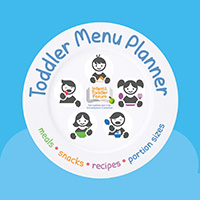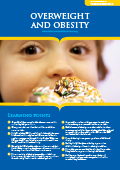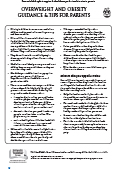
Use our Toddler Meal planning tool to ensure your 1-4 years old receives a balanced diet every day.
Find out more >
Use our toddler food tracker to check that your 1-4 year olds are getting a good balance of foods and activity
Find out more >
This educational programme for frontline professionals contains a range of practical resources on infant feeding.
Find out more >Guidance & Tips for Parents
The vast majority of overweight and obesity is caused by an imbalance between energy intake (amount of calories consumed in food and drinks) and energy expenditure (amount of energy used in activity).
Obesity in children is now common and obese children tend to remain obese as they grow up and become adults.
Obese children are eating more than they need and have a weight that is too great for their height. The excess weight is stored as fat which affects their health. They are more likely to get problems with their legs, more severe asthma, high blood pressure, heart disease and diabetes. They are also more likely to be bullied.
They do not have to lose weight. By staying the same weight they will get slimmer as they grow taller.
Medical causes of obesity are very rare and most children become overweight because they eat more than they need.
Check that your toddler is eating appropriate portion sizes – you can find them at https://www.infantandtoddlerforum.org/ portion-sizes-table
There are no medicines to treat young children who are obese. A healthy family lifestyle will prevent and treat overweight or obesity. You may need to make changes such as:
- increasing the time when you are all active – walking, playing together e.g. ball games, dancing, swimming. Praise your children when they are active. For example: ‘You are good at running and you run so fast now.’
- decreasing the time you spend in sedentary pursuits – such as sitting watching TV or playing computer games.
- eating a healthy diet and limiting foods high in fat or sugar such as crisps, sweets, and sweet drinks to once a week or less.
Make small gradual changes to family behaviour by making a list of changes you think will be possible for your family. Choose up to three changes and discuss them in your family and decide when you will start each change.
Talk to your extended family, such as grandparents, aunts and uncles, about the changes you are making so that they will not undermine them when they see your toddler. Also tell any other people who come to your home, such as baby sitters and friends.
Praise your children when they make these changes. They are more likely to follow them again as they like praise from parents.
Choose rewards other than food for your children. Do not give sweets or high-fat foods such as crisps as treats or for comfort and do not keep them in the house.
When the changes are successful choose up to three more to change.
Children with poor appetite control
Some children enjoy eating so much they are not necessarily aware when they have had enough to eat. They ask for food outside of meal and snack times and when they are bored. Some want to eat food whenever they see it.
- Only offer food at meal and planned snack times and do not use food to reward, treat or to comfort or change your child’s mood.
- Plan meals and snacks for the day (plan for three meals and two snacks) and tell your child what they can expect. Stick to your plan and carry healthy snacks with you when you go out.
- Suggest a non-food activity when children ask for food outside of planned eating times.
- Plan in the more desirable, high calorie foods about once per week; for example, an ice cream when at the park on Sunday, some chocolate after swimming on Friday, or cake at a birthday party.




